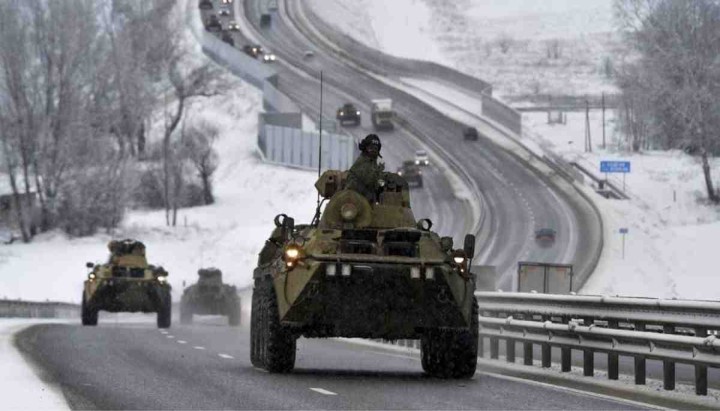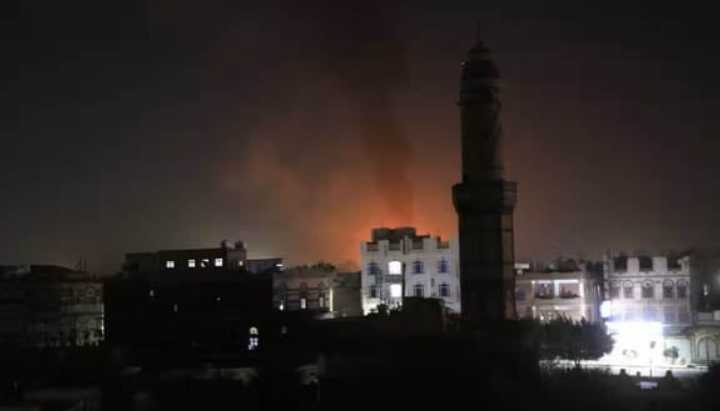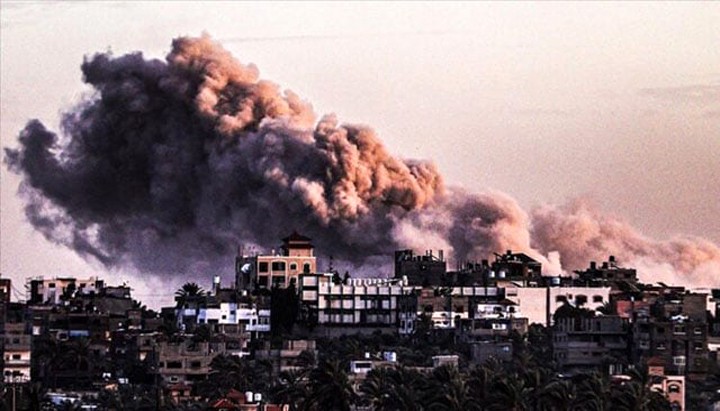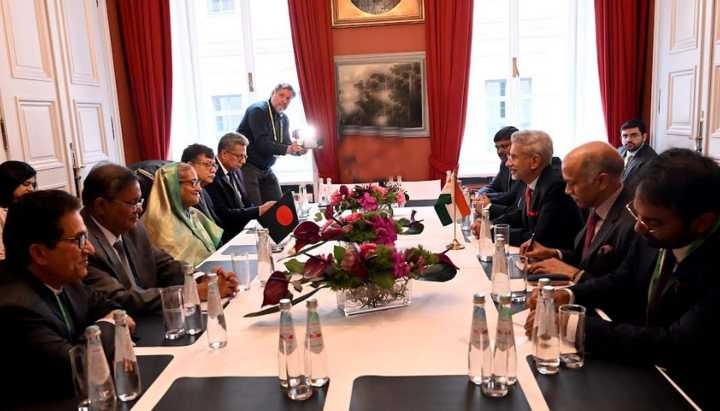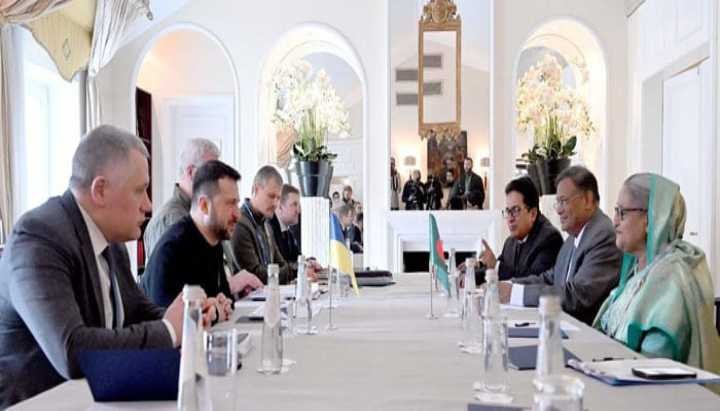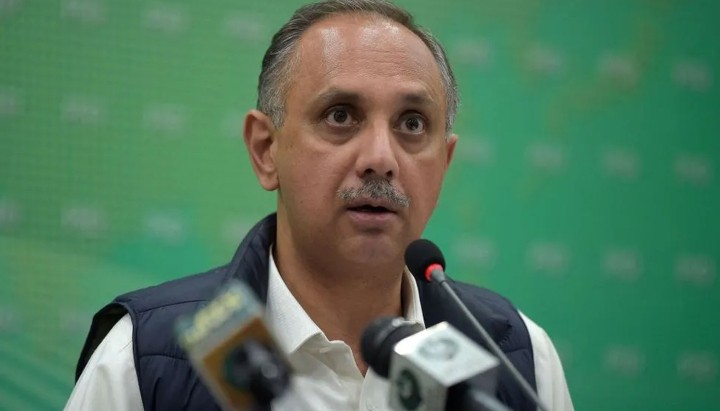The British government on Saturday accused Russia of seeking
to replace Ukraine’s government with a pro-Moscow administration, and said
former Ukrainian lawmaker Yevheniy Murayev is being considered as a potential
candidate.
Murayev is head of the small pro-Russian Party Nashi, which
currently has no seats in Ukraine’s parliament.
Britain’s Foreign Office named several other Ukrainian
politicians it said had links with Russian intelligence services.
It’s unclear what means Britain believes Russia might use to
install a friendly government in Kyiv.
The U.K. government made the claim based on an intelligence
assessment, without providing evidence to back it up. It comes amid a war of
words between Moscow and the West over Russia’s designs on Ukraine.
Foreign Secretary Liz Truss said the information “shines a
light on the extent of Russian activity designed to subvert Ukraine, and is an
insight into Kremlin thinking.”
Truss urged Russia to “de-escalate, end its campaigns of
aggression and disinformation, and pursue a path of diplomacy,” and reiterated
Britain’s view that “any Russian military incursion into Ukraine would be a
massive strategic mistake with severe costs.”
Britain has sent anti-tank weapons to Ukraine as part of
efforts to bolster its defenses against a potential Russian attack.
Amid diplomatic efforts to defuse the crisis, U.K. Defense
Secretary Ben Wallace is expected to meet Russian Defense Minister Sergei
Shoigu for talks in Moscow. No timing has been given for the meeting, which
would be the first U.K.-Russia bilateral defense talks since 2013.
The U.S. has mounted an aggressive campaign in recent months
to unify its European allies against a new Russian invasion of Ukraine. The
White House called the U.K. government assessment “deeply concerning” and said
it stands with the duly elected Ukrainian government.
“This kind of plotting is deeply concerning,” said National
Security Council spokeswoman Emily Horne. “The Ukrainian people have the
sovereign right to determine their own future, and we stand with our
democratically-elected partners in Ukraine.”
The assessment came as President Joe Biden spent Saturday at
the presidential retreat Camp David outside of Washington huddling with his
senior national security team about the Ukraine situation. A White House
official said the discussions included efforts to de-escalate the situation
with diplomacy and deterrence measures being coordinated closely with allies
and partners, including security assistance to Ukraine.
In another development, the Baltic nations of Estonia,
Latvia and Lithuania plan to send U.S.-made anti-tank and anti-aircraft
missiles to Ukraine, a move that the United States fully endorsed Saturday amid
Kyiv’s escalating tensions with Russia.
The defense ministers of the three Baltic states said in a
joint statement that they “stand united in our commitment to Ukraine’s
sovereignty and territorial integrity in face of continued Russian aggression.”
U.S. Secretary of State Antony Blinken said in a tweet that
Washington saluted the NATO nations and former Soviet republics “for their
longstanding support to Ukraine.”
“I expedited and authorized and we fully endorse transfers
of defensive equipment @NATO Allies Estonia Latvia Lithuania are providing to
Ukraine to strengthen its ability to defend itself against Russia’s unprovoked
and irresponsible aggression,” Blinken said in another tweet.
Kremlin spokesman Dmitry Peskov earlier this week described
the West supplying arms to Ukraine as extremely dangerous and said the
shipments “do nothing to reduce tensions.”
Moscow has massed tens of thousands of troops near the
Russia-Ukraine border, leading to fears of an invasion. The West has rejected
Moscow’s main demands — promises from NATO that Ukraine will never be added as
a member, that no alliance weapons will be deployed near Russian borders, and
that it will pull back its forces from Central and Eastern Europe.
A meeting Friday between Blinken and Russian Foreign
Minister Sergey Lavrov ended with no breakthrough. Amid the uncertain security
situation, the U.S. State Department has been considering a range of options to
ensure the safety and security of the U.S. Embassy in Kyiv and its employees by
moving to reduce its diplomatic presence there.
The defense ministers of the Baltic states said in their
statement that Estonia would provide Javelin anti-tank weapons while Latvia and
Lithuania were sending Stinger anti-aircraft missiles and other related
equipment to bolster Kyiv’s defensive military capabilities. It wasn’t
immediately clear when the weapons and equipment would be sent to Ukraine.
“Today, Ukraine is at the forefront of separating Europe
from the military conflict with Russia. Let´s face it, the war in Ukraine is
ongoing and it is important to support Ukraine in every way we can so that they
can resist the aggressor,” Estonian Defense Minister Kalle Laanet said.
Estonia also is seeking Germany’s approval to send
Soviet-made howitzers, which once belonged to East Germany, to Ukraine. Estonia
acquired the howitzers from non-NATO member Finland, which in turn had bought
them from Germany’s military surplus supply in the 1990s.
The German government said Friday that it was considering
Estonia’s request to pass the howitzers on to Ukraine but gave no timeline for
a decision. Berlin said it planned to coordinate the issue with Finland, which
has received a similar approval request from Estonia.
Berlin routinely demands a say when German-sold weapons are
transferred to third countries. But some recent media reports suggested German
Chancellor Olaf Scholz’s Cabinet could block Estonia’s transfer of weapons to
Kyiv, highlighting divisions in the West’s response to the Ukraine crisis.
Ukrainian Foreign Minister Dmytro Kuleba alleged Saturday
that Germany was not showing adequate support for Ukraine.
Kuleba said in a Twitter post that the weapons transfer
issue and remarks by German Foreign Minister Annalena Baerbock expressing
skepticism about cutting off Russia from the SWIFT global payments system “do
not correspond to the level of our relations and the current security
situation.”
Also Saturday, the Ukrainian Foreign Ministry summoned the
German ambassador to object to recently circulated video in which the head of
the German navy said that Ukraine would not regain the Crimean Peninsula, which
Russia annexed in 2014, and that Russian President Vladimir Putin deserved
“respect.”
The comments by vice admiral Kay-Achim Schoenbach sparked
consternation and a swift rebuke back in Berlin. By late Saturday, the German
navy chief had tendered his resignation, saying he wanted to prevent further
damage resulting from his “ill-considered statements” in India.
The U.S. State Department is currently warning U.S. citizens
not to visit Ukraine due to the coronavirus pandemic but is also advising them
to reconsider travel there due to potential Russian aggression.
Speculation that an announcement about the U.S. diplomatic
presence in Ukraine may be imminent has increased since the embassy in Kyiv
announced it would hold a virtual town hall meeting about the security
situation with U.S. citizens in Ukraine on Tuesday.
Discussions on the matter have been underway for some time,
but Blinken went over the contingency plans with the embassy’s security team
when he visited Kyiv on Wednesday, officials said.
The officials stressed that no decisions had yet been made
and that an outright evacuation is not being considered. One possible scenario
would be to order the families of American personnel to leave the country while
allowing non-essential staffers to depart voluntarily at government expense,
they said.


